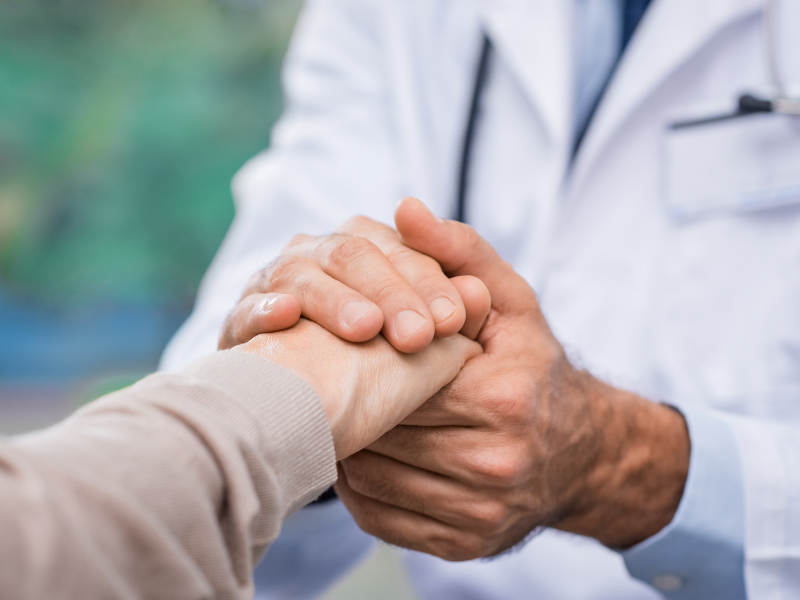Why cancer is disproportionally affecting LGBTI people

People are affected by cancer no matter what their identity is, but barriers in access to screening, prevention, and treatment puts LGBTI people at increased risk of developing fatal cancers. Keep reading to learn what can be done, so that no one is left behind in the fight against cancer.
Cancer is the second most common cause of death in Europe. With more than 3.7 million new cases every year, cancer prevention and screening programmes are crucial, yet LGBTI people are left lagging behind when it comes to this.
“The cancer community has recognised that the LGBTIQ+ community has historically been marginalised within the healthcare system, which translated into some discrimination, exclusion and unequal treatment in cancer care,” says Mike Morrissey, CEO of the European Cancer Organisation with whom we have been working together.
“This can often be caused by a lack of awareness of the specific needs of the community, policy guidelines that need updating to address the needs of marginalised communities, and the lack of inclusive language in both health documentation and medical check-ups, to name a few examples,” Morrissey adds.
Moving away from gendered language
Trans, intersex, non-binary and third gender people exist in Europe, but are left out when screening, prevention and treatment use binary categories to determine risk factors and eligibility. To put it more plainly, when your body doesn’t fit the binary boxes of ‘female’ or male’, this means that you may not receive the cancer care that your body needs.
Access to health services should be dictated by a person’s body parts and what their organs require to stay healthy. For example, when stating ‘women require mammograms’, we are leaving out those who are not women but are at the same risk of developing breast cancer. Moving away from gendered language in cancer prevention plans and instead referring to specific body parts, will ensure than trans, intersex, non-binary and third gender people can access to the screenings and treatment their bodies need.
Increased risk and lack of prevention for LGBTI people
Some studies suggest higher cancer rates for LGBTI people. While research into the reasons behind this greater prevalence is still too limited, we know that LGBTI people access routine healthcare less frequently than others. Some of the reasons are:
Fear of discrimination
Have you ever worried about talking about your sexual orientation, your sexual experiences, your gender identity, or your sex characteristics to your doctor because you are unsure if you will be treated the same way after you have shared this information? You are not alone. Fear of being discriminated against often prevents LGBTI people from sharing relevant information that could affect their health.
Limitations in access
Many LGBTI people encounter barriers in access to employment or education. These barriers prevent them from accessing healthcare too, and can prevent them having adequate health insurance coverage.
Negative experiences with healthcare providers
It is difficult to reach out to someone when you anticipate an uncomfortable time with them. Fear of having a negative experience with a healthcare provider can lead some LGBTI people to delay or avoid medical care, especially routine care such as screenings for early detection. Missing routine cancer screenings can lead to cancer being diagnosed at a later stage, when can be harder to treat.
Misinformation about cancer risks
Trans and intersex people in particular have historically been exposed to significant human rights violations in healthcare settings. For example, many trans and intersex people report non-consented or coerced gonadectomies wherein the “risk of cancer” was used as a motivator to encourage them or their parents to “consent” to the surgery. This brings further distrust of healthcare providers when it comes to discussions of cancer risks and treatments.
This is why any EU or national plans against cancer must ensure that LGBTI people will receive the screenings and treatments they need, when they need them, and with equal coverage under insurance schemes. As Mike Morrissey states, “the European Cancer Organisation could not achieve its mission to improve outcomes and quality of care for all cancer patients, if one specific marginalised community is not included in the advancements of the cancer community at large. It is therefore of utmost importance for us to bring together the cancer community and guide the effort in fighting for equity for all citizens and cancer patients regardless of their background.”
You can check out our latest feedback to the European Commission and more submissions to the EU Cancer Plan and the Cancer Screening Recommendation.